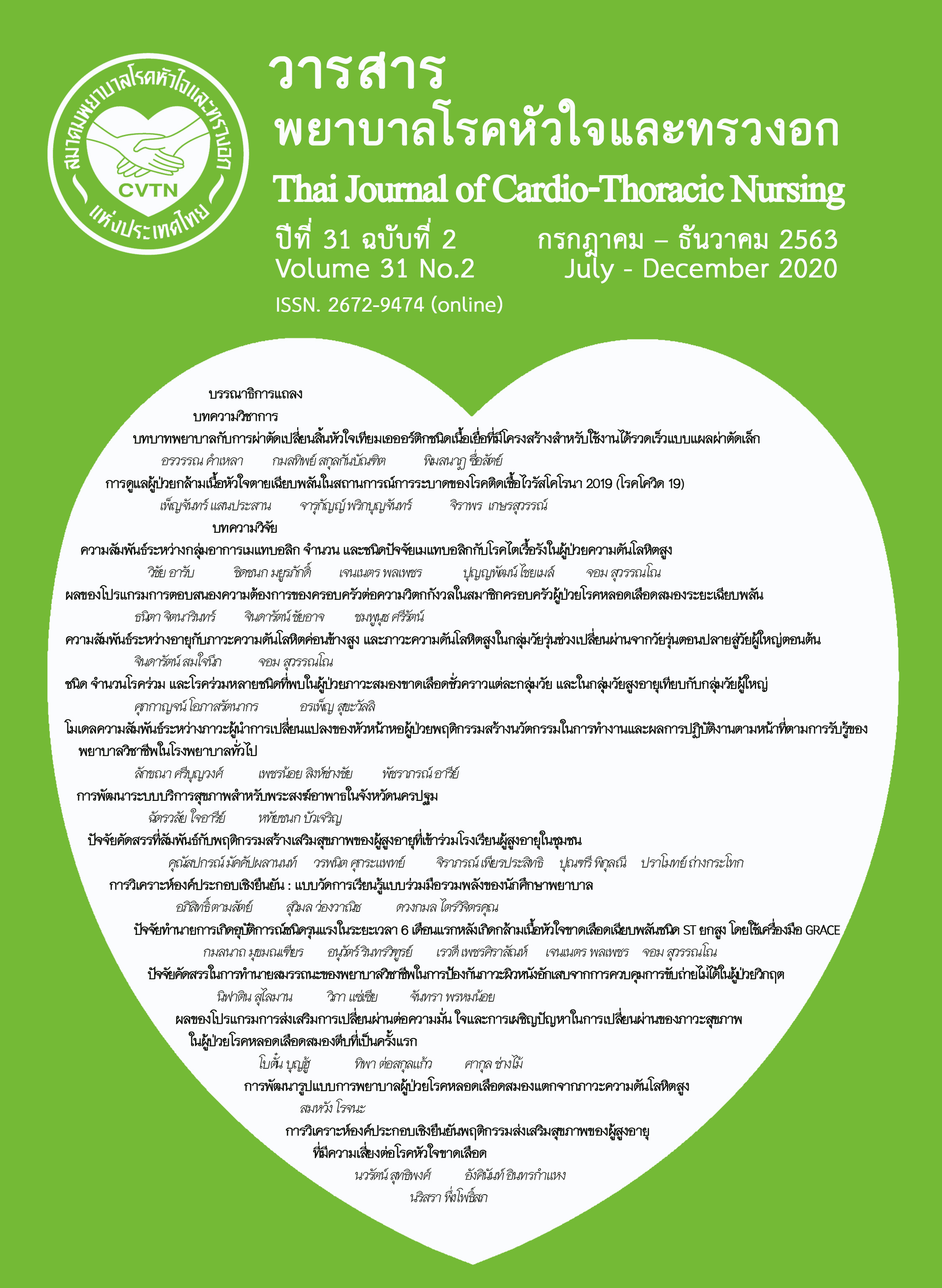Predictors of major adverse cardiovascular events within six- months post-ST elevation myocardial infarction using GRACE risk score
Keywords:
GRACE risk score, ST elevation myocardial infarction, major adverse cardiovascular eventsAbstract
This analytical, prospective study aimed to determine risk level and predictors for major adverse cardiovascular events using the Otago-Southland Global Registry of Acute Coronary Events (GRACE) risk score. Eligible 181 STEMI patients who admitted at a 600-bed tertiary hospital from October, 2017 to March, 2018 were recruited. Logistic regression was used to determine the predictors of major adverse cardiovascular events.
Results:The higher GRACE scores were associated significantly with major adverse cardiovascular events (Chi-square 14.04, p = 0.001). An approximate 13-fold increment in mortality risk was found in STEMI patients with moderate scores risk (OR 13.6, 95%Cl 1.75-106.48) and a 22 fold increase in those with severe scores (OR 22.5, 95%Cl 2.75-185.4). The final multivariate model showed that nine risk factors could significantly explained for 86.2% (p = 0.001) of mortality risk. An increment in mortality risk was found in STEMI patients with aged > 60 years, previous myocardial ischemia, heart rate at ER of > 90 beat per minute, systolic blood pressure at ER of < 160 mmHg, serum creatinine of > 0.8 mg/dl, a history of heart failure, elevated cardiac enzymes, and post percutaneous coronary intervention.
Using the GRACE risk score can be prognostic a major adverse cardiovascular event for the first
six-month after discharge. Patients with STEMI who had moderate-to-severe GRACE risk scores require further developed specific health care and follow-up system in order to prevent the major adverse cardiovascular events.
References
Bobadilla RV. Acute coronary syndrome: focus on antiplatelet therapy. Crit Care Nurse. 2016; 36(1): 15-17. doi:10.4037/ccn2016497.
World Health Organization. Cardiovascular disease (CVDs). [Cited 2020, Nov 7]. Available from: https://www.who.int/news-room/fact-sheets/detail/cardiovascular-diseases-(cvds).
Ministry of Public Health. Twenty-year national strategic plan for public health: 2017-2036. [Cited 2020, Nov 7]. Available from: http://164.115.27.97/digital/files/original/2ddc0ac1ececa4c666af70165c23e011.pdf.
Tang EW, Wong C, Herbison P. Global Registry of Acute Coronary Events (GRACE) hospital discharge risk score accurately predicts long-term mortality post acute coronary syndrome. Am Heart J. 2007; 153: 29-35.
Fox KAA, Dobbous OH, Goldberg RJ, Pieper KS, Eagle KA, Van de Werf F, et al. Prediction of risk of death and myocardial infarction in the six months after presentation with acute coronary syndrome: prospective multinational observational study (GRACE). BMJ. 2006; 333: 1091-4.
Eagle KA, Lim MJ, Dabbous OH. A validated prediction model for acute coronary syndrome. JAMA. 2004; 291(22): 2727-33.
Fox KAA, FitzGerald G, Puymirat E, Huang W, Carruthers K, Simon T, et al. Should patients with acute coronary disease be stratified for management according to their risk? Derivation, external validation and outcomes using the updated GRACE risk score. BMJ Open. 2014; 4(2): e004425.
Granger CB, Goldberg RJ, Dabbous O, Pieper KS, Eagle KA, Cannon C, et al. Predictors of hospital mortality in the Global Registry of Acute Coronary Events. Arch Intern Med. 2003;163(19): 2345–53.
Bentler PM, Chou C. Practical issues in structural modeling. Social Methods and Res. 1987;16: 78-117. doi:10.1177/0049124187016001004.
Baury AA, Kumbhani DJ, Gong Y, Handberg EM, Cooper-DeHoff RM, Pepine CJ. Simple integer risk score to determine prognosis of patients with hypertension and chronic stable coronary artery disease. J Am Heart Assoc. 2013; 2(4): e00205. doi.org/10.1161/JAHA.113.000205.
Boersma E, Pieper KS, Steyerberg EW, Wilcox RG, Chang W, Lee K, et al. Predictors of outcome in patients with acute coronary syndromes without persistent ST-segment elevation: results from a international trial of 9461 patients. Circulation. 2000; 101: 2557-67.
Newby LK, Bhapkar MV, White HD, Topol EJ, Dougherty FC, Harrington RA, et al. For the SYMPHONY and 2nd SYMPHONY Investigators. Predictors of 90-day outcome in patients stabilized after acute coronary syndrome. Eur Heart J. 2003; 24: 172-81.
Goldberg RJ, Currie K, White K, Brieger D, Stey PG, Goodman SG, et al. Six-month outcomes in a multinational registry of patients hospitalized with an acute coronary syndrome (The Global Registry of Acute Coronary Events [GRACE]). Am J Cardiol. 2004;93: 288-93.
Downloads
Published
How to Cite
Issue
Section
License
บทความนี้ยังไม่เคยตีพิมพ์หรืออยู่ในระหว่างส่งไปตีพิมพ์ในวารสารอื่น ๆ มาก่อน และกองบรรณาธิการขอสงวนสิทธิ์ในการตรวจทาน และแก้ไขต้นฉบับตามเกณฑ์ของวารสาร ในกรณีที่เรื่องของท่านได้ได้รับการตีพิมพ์ในวารสารฉบับนี้ถือว่าเป็น ลิขสิทธิ์ของวารสารพยาบาลโรคหัวใจและทรวงอก






